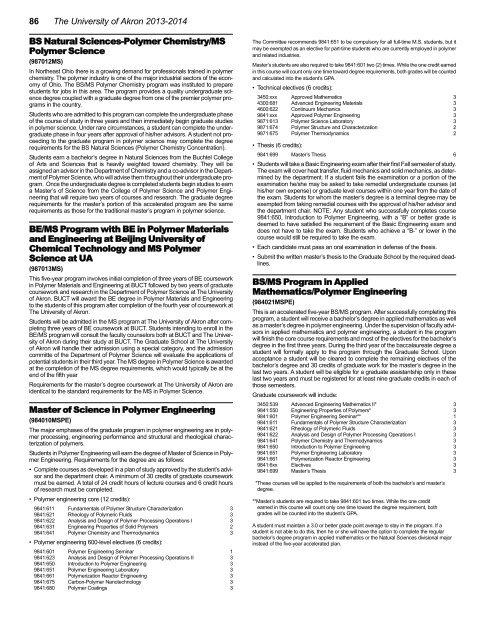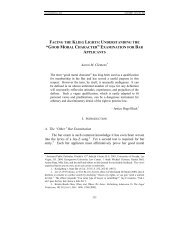2013-2014 GRADUATE BULLETIN - The University of Akron
2013-2014 GRADUATE BULLETIN - The University of Akron
2013-2014 GRADUATE BULLETIN - The University of Akron
Create successful ePaper yourself
Turn your PDF publications into a flip-book with our unique Google optimized e-Paper software.
86 <strong>The</strong> <strong>University</strong> <strong>of</strong> <strong>Akron</strong> <strong>2013</strong>-<strong>2014</strong><br />
BS Natural Sciences-Polymer Chemistry/MS<br />
Polymer Science<br />
(987012MS)<br />
In Northeast Ohio there is a growing demand for pr<strong>of</strong>essionals trained in polymer<br />
chemistry. <strong>The</strong> polymer industry is one <strong>of</strong> the major industrial sectors <strong>of</strong> the economy<br />
<strong>of</strong> Ohio. <strong>The</strong> BS/MS Polymer Chemistry program was instituted to prepare<br />
students for jobs in this area. <strong>The</strong> program provides a quality undergraduate science<br />
degree coupled with a graduate degree from one <strong>of</strong> the premier polymer programs<br />
in the country.<br />
Students who are admitted to this program can complete the undergraduate phase<br />
<strong>of</strong> the course <strong>of</strong> study in three years and then immediately begin graduate studies<br />
in polymer science. Under rare circumstances, a student can complete the undergraduate<br />
phase in four years after approval <strong>of</strong> his/her advisors. A student not proceeding<br />
to the graduate program in polymer science may complete the degree<br />
requirements for the BS Natural Sciences (Polymer Chemistry Concentration).<br />
Students earn a bachelor’s degree in Natural Sciences from the Buchtel College<br />
<strong>of</strong> Arts and Sciences that is heavily weighted toward chemistry. <strong>The</strong>y will be<br />
assigned an advisor in the Department <strong>of</strong> Chemistry and a co-advisor in the Department<br />
<strong>of</strong> Polymer Science, who will advise them throughout their undergraduate program.<br />
Once the undergraduate degree is completed students begin studies to earn<br />
a Master’s <strong>of</strong> Science from the College <strong>of</strong> Polymer Science and Polymer Engineering<br />
that will require two years <strong>of</strong> courses and research. <strong>The</strong> graduate degree<br />
requirements for the master’s portion <strong>of</strong> this accelerated program are the same<br />
requirements as those for the traditional master’s program in polymer science.<br />
BE/MS Program with BE in Polymer Materials<br />
and Engineering at Beijing <strong>University</strong> <strong>of</strong><br />
Chemical Technology and MS Polymer<br />
Science at UA<br />
(987013MS)<br />
This five-year program involves initial completion <strong>of</strong> three years <strong>of</strong> BE coursework<br />
in Polymer Materials and Engineering at BUCT followed by two years <strong>of</strong> graduate<br />
coursework and research in the Department <strong>of</strong> Polymer Science at <strong>The</strong> <strong>University</strong><br />
<strong>of</strong> <strong>Akron</strong>. BUCT will award the BE degree in Polymer Materials and Engineering<br />
to the students <strong>of</strong> this program after completion <strong>of</strong> the fourth year <strong>of</strong> coursework at<br />
<strong>The</strong> <strong>University</strong> <strong>of</strong> <strong>Akron</strong>.<br />
Students will be admitted in the MS program at <strong>The</strong> <strong>University</strong> <strong>of</strong> <strong>Akron</strong> after completing<br />
three years <strong>of</strong> BE coursework at BUCT. Students intending to enroll in the<br />
BE/MS program will consult the faculty counselors both at BUCT and <strong>The</strong> <strong>University</strong><br />
<strong>of</strong> <strong>Akron</strong> during their study at BUCT. <strong>The</strong> Graduate School at <strong>The</strong> <strong>University</strong><br />
<strong>of</strong> <strong>Akron</strong> will handle their admission using a special category, and the admission<br />
committe <strong>of</strong> the Department <strong>of</strong> Polymer Science will evaluate the applications <strong>of</strong><br />
potential students in their third year. <strong>The</strong> MS degree in Polymer Science is awarded<br />
at the completion <strong>of</strong> the MS degree requirements, which would typically be at the<br />
end <strong>of</strong> the fifth year<br />
Requirements for the master’s degree coursework at <strong>The</strong> <strong>University</strong> <strong>of</strong> <strong>Akron</strong> are<br />
identical to the standard requirements for the MS in Polymer Science.<br />
Master <strong>of</strong> Science in Polymer Engineering<br />
(984010MSPE)<br />
<strong>The</strong> major emphases <strong>of</strong> the graduate program in polymer engineering are in polymer<br />
processing, engineering performance and structural and rheological characterization<br />
<strong>of</strong> polymers.<br />
Students in Polymer Engineering will earn the degree <strong>of</strong> Master <strong>of</strong> Science in Polymer<br />
Engineering. Requirements for the degree are as follows:<br />
• Complete courses as developed in a plan <strong>of</strong> study approved by the student’s advisor<br />
and the department chair. A minimum <strong>of</strong> 30 credits <strong>of</strong> graduate coursework<br />
must be earned. A total <strong>of</strong> 24 credit hours <strong>of</strong> lecture courses and 6 credit hours<br />
<strong>of</strong> research must be completed.<br />
• Polymer engineering core (12 credits):<br />
9841:611 Fundamentals <strong>of</strong> Polymer Structure Characterization 3<br />
9841:621 Rheology <strong>of</strong> Polymeric Fluids 3<br />
9841:622 Analysis and Design <strong>of</strong> Polymer Processing Operations I 3<br />
9841:631 Engineering Properties <strong>of</strong> Solid Polymers 2<br />
9841:641 Polymer Chemistry and <strong>The</strong>rmodynamics 3<br />
• Polymer engineering 600-level electives (6 credits):<br />
9841:601 Polymer Engineering Seminar 1<br />
9841:623 Analysis and Design <strong>of</strong> Polymer Processing Operations II 3<br />
9841:650 Introduction to Polymer Engineering 3<br />
9841:651 Polymer Engineering Laboratory 3<br />
9841:661 Polymerization Reactor Engineering 3<br />
9841:675 Carbon-Polymer Nanotechnology 3<br />
9841:680 Polymer Coatings 3<br />
<strong>The</strong> Committee recommends 9841:651 to be compulsory for all full-time M.S. students, but it<br />
may be exempted as an elective for part-time students who are currently employed in polymer<br />
and related industries.<br />
Master’s students are also required to take 9841:601 two (2) times. While the one credit earned<br />
in this course will count only one time toward degree requirements, both grades will be counted<br />
and calculated into the student’s GPA.<br />
• Technical electives (6 credits):<br />
3450:xxx Approved Mathematics 3<br />
4300:681 Advanced Engineering Materials 3<br />
4600:622 Continuum Mechanics 3<br />
9841:xxx Approved Polymer Engineering 3<br />
9871:613 Polymer Science Laboratory 3<br />
9871:674 Polymer Structure and Characterization 2<br />
9871:675 Polymer <strong>The</strong>rmodynamics 2<br />
• <strong>The</strong>sis (6 credits):<br />
9841:699 Master’s <strong>The</strong>sis 6<br />
• Students will take a Basic Engineering exam after their first Fall semester <strong>of</strong> study.<br />
<strong>The</strong> exam will cover heat transfer, fluid mechanics and solid mechanics, as determined<br />
by the department. If a student fails the examination or a portion <strong>of</strong> the<br />
examination he/she may be asked to take remedial undergraduate courses (at<br />
his/her own expense) or graduate level courses within one year from the date <strong>of</strong><br />
the exam. Students for whom the master’s degree is a terminal degree may be<br />
exempted from taking remedial courses with the approval <strong>of</strong> his/her advisor and<br />
the department chair. NOTE: Any student who successfully completes course<br />
9841:650, Introduction to Polymer Engineering, with a “B” or better grade is<br />
deemed to have satisfied the requirement <strong>of</strong> the Basic Engineering exam and<br />
does not have to take the exam. Students who achieve a “B-” or lower in the<br />
course would still be required to take the exam.<br />
• Each candidate must pass an oral examination in defense <strong>of</strong> the thesis.<br />
• Submit the written master’s thesis to the Graduate School by the required deadlines.<br />
BS/MS Program in Applied<br />
Mathematics/Polymer Engineering<br />
(984021MSPE)<br />
This is an accelerated five-year BS/MS program. After successfully completing this<br />
program, a student will receive a bachelor’s degree in applied mathematics as well<br />
as a master’s degree in polymer engineering. Under the supervision <strong>of</strong> faculty advisors<br />
in applied mathematics and polymer engineering, a student in the program<br />
will finish the core course requirements and most <strong>of</strong> the electives for the bachelor’s<br />
degree in the first three years. During the third year <strong>of</strong> the baccalaureate degree a<br />
student will formally apply to the program through the Graduate School. Upon<br />
acceptance a student will be cleared to complete the remaining electives <strong>of</strong> the<br />
bachelor’s degree and 30 credits <strong>of</strong> graduate work for the master’s degree in the<br />
last two years. A student will be eligible for a graduate assistantship only in these<br />
last two years and must be registered for at least nine graduate credits in each <strong>of</strong><br />
those semesters.<br />
Graduate coursework will include:<br />
3450:539 Advanced Engineering Mathematics II* 3<br />
9841:550 Engineering Properties <strong>of</strong> Polymers* 3<br />
9841:601 Polymer Engineering Seminar** 1<br />
9841:611 Fundamentals <strong>of</strong> Polymer Structure Characterization 3<br />
9841:621 Rheology <strong>of</strong> Polymeric Fluids 3<br />
9841:622 Analysis and Design <strong>of</strong> Polymer Processing Operations I 3<br />
9841:641 Polymer Chemistry and <strong>The</strong>rmodynamics 3<br />
9841:650 Introduction to Polymer Engineering 3<br />
9841:651 Polymer Engineering Laboratory 3<br />
9841:661 Polymerization Reactor Engineering 3<br />
9841:6xx Electives 3<br />
9841:699 Master’s <strong>The</strong>sis 3<br />
*<strong>The</strong>se courses will be applied to the requirements <strong>of</strong> both the bachelor’s and master’s<br />
degree.<br />
**Master’s students are required to take 9841:601 two times. While the one credit<br />
earned in this course will count only one time toward the degree requirement, both<br />
grades will be counted into the student’s GPA.<br />
A student must maintain a 3.0 or better grade point average to stay in the program. If a<br />
student is not able to do this, then he or she will have the option to complete the regular<br />
bachelor’s degree program in applied mathematics or the Natural Sciences divisional major<br />
instead <strong>of</strong> the five-year accelerated plan.

















